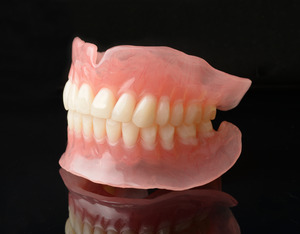
You’re probably already aware of how dentures can improve your ability to eat and speak after extensive tooth loss. However, there are a few things you may not realize about life with your new prosthesis. For one thing, if you’re not careful, your replacement teeth might eventually develop an unpleasant odor. Your dentist is here to explain what can cause dentures to smell bad as well as what you can do to stop it from happening.
What Can Make Dentures Smell Bad?
Dentures spend a lot of time in your mouth. Consequently, they are frequently exposed to all kinds of oral bacteria on a daily basis. As time passes, more and more bacteria will start to accumulate on your dentures, making their homes in small pores on the surface of the prosthesis. If nothing is done to get rid of the bacteria, your dentures may start to smell.
What Can You Do to Stop Dentures from Smelling Bad?
Fortunately, there are plenty of steps you can take in order to maintain odor-free dentures. Here are a few key tips to keep in mind:
- Make a point of keeping your dentures clean. This means rinsing them off after every meal as well as brushing them on a daily basis. When you take your dentures out at night, be sure to leave them soaking in a denture-cleaning solution.
- Do what you can to avoid a dry mouth, as lack of saliva can make it easier for unwanted oral bacteria to build up on your dentures. Make sure that you stay hydrated so that your body can produce all the saliva it needs; that means drinking plenty of water while limiting your exposure to caffeine and alcohol.
- Don’t just focus on cleaning your dentures; you should also do what you can to fight plaque and bacteria elsewhere in your mouth. Whenever you remove your dentures, you should take the time to clean your gums and other soft oral tissues with a toothbrush.
- Remember to visit your dentist on a regular basis. They can check your dentures to make sure they’re still in good condition and get rid of any bacteria buildup that you may have overlooked. Additionally, they can examine your mouth for any oral health issues that could also be linked to an unpleasant smell, such as gum disease.
It’s hard to feel confident about your smile when your dentures have an unpleasant smell. Luckily, with the right precautions, you can keep your prosthesis odor-free in the long term. Remember that you can always reach out to your dentist if you would like additional denture hygiene advice.
About the Author
Dr. Rodger Song has over 30 years of dental experience. He graduated from the Baylor College of Dentistry and has received a Fellowship from the Academy of General Dentistry. His practice, Bridlewood Dental of Flower Mound, offers a number of solutions for patients with missing teeth, including personalized dentures. To schedule a consultation with Dr. Song, visit his website or call (972) 906-9797.

